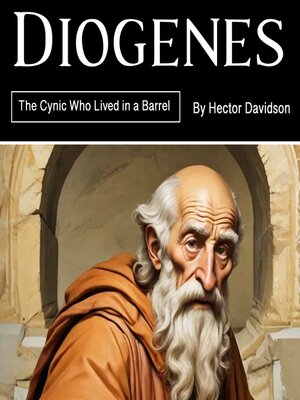
Sign up to save your library
With an OverDrive account, you can save your favorite libraries for at-a-glance information about availability. Find out more about OverDrive accounts.
Find this title in Libby, the library reading app by OverDrive.



Search for a digital library with this title
Title found at these libraries:
| Library Name | Distance |
|---|---|
| Loading... |
Diogenes of Sinope, one of the most famous figures in ancient philosophy, is a man whose life and ideas have left an indelible mark on the world. Known for his eccentric behavior and unwavering commitment to a life of simplicity, Diogenes was one of the founders of the philosophical school of Cynicism. His life was a statement, rejecting the norms and conventions of society in pursuit of a personal freedom that few could fully understand, much less emulate. To this day, his legacy remains a profound reminder of the power of nonconformity and the pursuit of virtue above material wealth.
Born in Sinope (modern-day Sinop, Turkey), Diogenes was a figure who viewed the world with a unique lens. He rejected the luxuries and complexities of Athenian society, seeking instead a life of self-sufficiency, minimalism, and authenticity. His choice to live in a barrel, or more accurately, a large ceramic jar, in Athens became a symbol of his commitment to simplicity and his disdain for materialism. Diogenes wasn't just a philosopher; he was a living critique of the social structures around him. His constant questioning of authority, wealth, and societal expectations created a lasting legacy that went beyond words and doctrines.
The Cynic philosophy that Diogenes embodied was radical for its time. It was a philosophy that urged individuals to cast off the superficial trappings of society—wealth, fame, and social standing—and instead focus on living virtuously and naturally. Diogenes practiced what he preached, often engaging in acts that were both shocking and humorous, yet deeply philosophical. His public antics, such as walking around Athens in broad daylight with a lantern claiming to be "looking for an honest man," were not mere provocations but expressions of a profound philosophical stance against the moral decay he saw in society.







